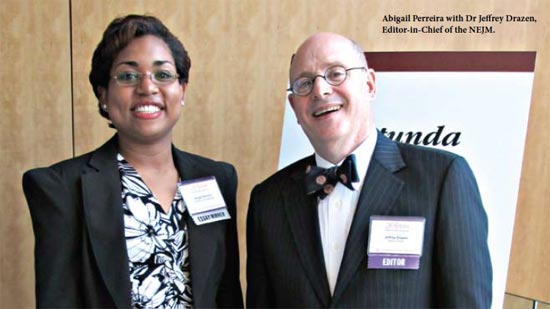
Abigail Perreira, a Year Three student reading for the Bachelor of Medicine, Bachelor of Surgery (MBBS) programme at The UWI, was selected as a Scholar/Essay winner by the New England Journal of Medicine (NEJM). The prestigious journal celebrates its 200th anniversary this year and among the events marking the milestone was an essay competition which received thousands of submissions, a fraction of which were selected for publication.
 Abigail was invited to the symposium, “Dialogues in Medicine” at the Harvard Medical University, Boston, in June on the basis of her essay, “Harnessing Technology to Improve Health Care.” The dialogues focused on HIV/AIDS, Breast Cancer, Maternal and Foetal Health and Cardiology. Abigail was invited to the symposium, “Dialogues in Medicine” at the Harvard Medical University, Boston, in June on the basis of her essay, “Harnessing Technology to Improve Health Care.” The dialogues focused on HIV/AIDS, Breast Cancer, Maternal and Foetal Health and Cardiology.
Saying she felt honoured to be mentored in this way, the mother of a boy just about to enter primary school, said that since she was his age she knew she wanted to be a doctor.
“The speakers encouraged and challenged us, the NEJM Scholars, to pursue new research in medicine and to collectively make new discoveries in our respective fields. We definitely accepted that challenge since at the end of the day we had already formed an online group where we can discuss our research ideas in order to bring our own essays to reality. The physicians emphasized the importance of perseverance, passion and determination as keys to success,” she said.
“My mother made it a daily habit of telling me I could do anything in this world and be anything I wanted to be. Her words of encouragement have always resonated in my mind and so far I followed my passion,” she said as she praised UWI lecturers, whom she says have been “truly dedicated in providing us with an exceptional education.”
“I definitely intend on specializing after I graduate, because there is always a demand for continuing medical education. As to exactly what field of specialty, I'm not quite sure, since I indeed would like to explore all options before I make my final decision.”
Abigail declares she is having the best time of her life, with peers who are like family, teachers who care, her own close family, passion for her field, and international recognition.
Here is the essay which was published by NEJM (http://nejm200.nejm.org/essay/harnessing-technology-to-improve-health/)

The rapid evolution of computerized technology makes it mandatory to properly utilize this scientific knowledge within the health care system. This can be achieved by the use of the famous internet, world wide web and social networking. Widespread use of computerized Smart System programs involving specialty and sub-specialty fields of medicine can be used by physicians. In addition, the development of a universal medical secure server in which all patient records are stored should be created.
Facebook and Twitter are websites whereby the physician can directly interact with patients. Doctors can expand patient care without the burden of physically administering medical attention, while patients gain valuable advice for problems they have. Higher quality of doctor-patient relations can thus be cultivated. Currently, medical professionals from all over the world can now attend clinical conferences for patient care discussions without leaving their individual practices, eg via the use of Skype. Profitable information from these professionals who otherwise may not have ever met in person can be integrated and focused for the successful diagnosis, treatment and management of a patient. X-rays, CT scans and MRIs from one hospital can also be sent via internet email to a doctor or even a hospital on the other side of the world for case review.
Computerized Smart Systems for specialties like cardiology, paediatrics or even minor surgery, which contains various step by step procedures involving diagnostics methods, treatment and patient care can be created and made more accessible to junior physicians, nurses and other health personnel not yet fully trained in the particular field. It therefore suggests that information otherwise esoteric could be made available to health workers. In every country, there is always the demand for delivering much needed medical aid to those impoverished in society. As such the number of patients that can be better treated by the available health care professionals in rural or remote communities will be multiplied. The patient thus gains much needed special attention that otherwise may not have been available owing to a paucity of specialists.
In my point of view a universal medical/health care secure server should be created, one in which doctors can access confidential medical history and details of every patient globally. This will enhance efficiency of treatment since no matter where a person is located in the world his/her records can be accessed by licensed medical professionals especially if he/she is in an emergency situation. This reduces errors of uncertainty and misdiagnosis that can result in fatality.
Global hospital networking can greatly improve the lives of millions. Along with this comes the enormous responsibility of patient confidentiality and as such a great deal of finances is required to be invested in the security of this server of the future. However, benefits will outweigh initial sacrifices.
In conclusion, with technology of the internet, doctors develop a closer relationship with patients, medical Smart Systems and globalized hospital networking can deliver better, more efficient health and patient care. |





